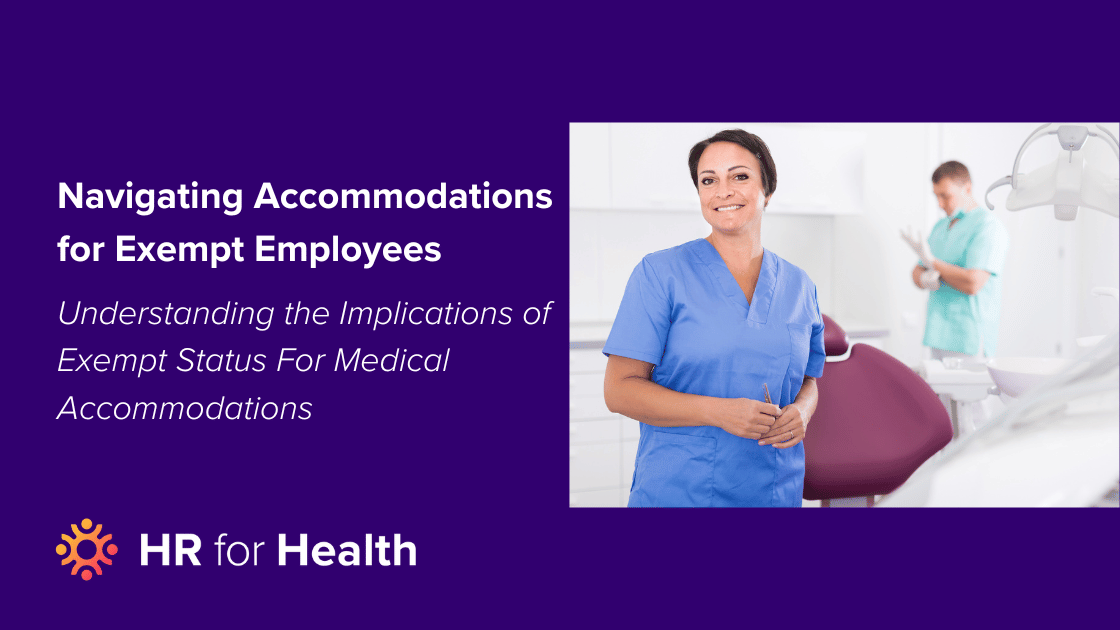- Documentation
- Employee classification
- HR Compliance
Navigating Accommodations for Exempt Employees: Understanding the Implications of Exempt Status For Medical Accommodations

The exempt status for medical accommodations is a complicated issue that impacts healthcare organizations across the industry. Healthcare professionals need to be aware of how this status could impact how they treat and administer various regulations, protocols, and policies throughout their departments. At HR for Health, we understand how complicated these issues can be, and we provide the necessary guidance to ensure you foster a positive company culture and comply with all relevant regulations.
Defining Exempt Status: What It Means for Your Healthcare Organization
Exempt employees, as defined by federal labor laws, are professionals who meet specific criteria exempting them from minimum wage and overtime pay requirements. In healthcare, this status often applies to licensed practitioners, administrators, and some senior staff. Understanding who qualifies as exempt is crucial for HR professionals, as it determines the scope of labor laws and accommodations. Misclassification can lead to legal challenges and impact employee morale.
The determination of exempt status requires a thorough analysis of job duties, salary levels, and compliance with specific exemptions outlined by the Fair Labor Standards Act (FLSA). It’s not just about the title because the actual job functions and salary must meet federal criteria. This classification affects how accommodations, including medical or disability-related ones, are managed. Healthcare organizations must navigate these regulations carefully to maintain compliance and support their staff effectively.
Legal Framework for Accommodations: ADA and FMLA Considerations
The Americans with Disabilities Act (ADA) and the Family and Medical Leave Act (FMLA) are two pivotal laws governing accommodations for employees, including those with exempt status. The ADA requires employers to provide reasonable accommodations to qualified employees with disabilities, whereas the FMLA entitles eligible employees to take unpaid, job-protected leave for specified family and medical reasons. Both laws play a significant role in the healthcare sector, so healthcare organizations and HR departments must be well-versed in these requirements.
Understanding these laws is essential for ensuring that healthcare organizations not only comply with legal obligations but also support their employees effectively. The ADA’s mandate for reasonable accommodation necessitates a flexible approach to job modifications, while the FMLA’s provisions ensure employees can take necessary time off without fear of job loss. Healthcare organizations must navigate these regulations with sensitivity and precision, balancing legal compliance with compassionate employee support.
Assessing Medical Accommodations: Balancing Employee Needs and Organizational Capabilities
When an exempt employee requests medical accommodation, healthcare organizations must undertake a careful assessment process. This involves evaluating the necessity of the requested accommodation and its feasibility within the organizational context. Each request must be considered on its own merits. Organizations must understand the employee’s role and the essential functions of their job. The goal is to find a balance that supports the employee’s health needs while still meeting the organization’s operational requirements.
This process should include a dialogue between the employer and employee to identify appropriate accommodations. It may include adjusting work schedules, modifying job duties, or providing assistive technologies. These accommodations need collaborative problem-solving, and should reflect a commitment to the employe’s well-being and organizational integrity.
Maintaining Compliance: Documentation and Procedures for Exempt Employee Accommodations
Effective documentation is paramount for ensuring compliance with employment laws related to exempt employee accommodations. Healthcare organizations must ensure that all requests for accommodations are documented thoroughly, including the nature of the accommodation, the interactive process, and the final outcome.
Developing and following standardized procedures for handling accommodation requests not only aids in compliance but also ensures consistency and fairness in the treatment of all employees. These procedures should include clear steps for submitting requests, timelines for response, and mechanisms for appeal or further discussion if needed. This ensures healthcare organizations demonstrate their dedication to supporting their employees while safeguarding against potential legal challenges.
Impact on Pay and Benefits: Understanding the Implications for Exempt Employees
The provision of accommodations to exempt employees may raise questions about the impact on pay and benefits. Under the FLSA, exempt employees are generally salaried and not eligible for overtime pay, but accommodations may require adjustments to work hours or duties that could blur these lines. HR professionals must navigate these changes carefully and ensure these accommodations do not inadvertently alter an employee’s exempt status or entitlements.
In some cases, accommodations may result in a temporary reassignment to a non-exempt role or modified work schedule. In these situations, HR must communicate clearly with the affected employee about any implications for their salary or benefits. Transparency and fairness are key to maintaining trust and morale among staff, particularly when dealing with sensitive health-related accommodations.
Best Practices for HR Professionals in Healthcare
- Develop a Clear Policy: Establish and communicate clear policies on medical accommodations, including the process for requesting accommodations and the criteria for approval. This clarity helps manage expectations and ensures a fair and consistent approach.
- Promote an Inclusive Culture: Encourage a workplace culture that values diversity and inclusion, making it easier for employees to request accommodations without fear of stigma or retaliation. An inclusive environment fosters openness and trust.
- Invest in Training: Provide training for managers and HR staff on the legal requirements for accommodations and best practices for engaging in the interactive process. Well-informed staff are better equipped to handle requests sensitively and effectively.
- Leverage Technology: Leverage technology to facilitate the accommodations process, from request submission to tracking implementation. Digital tools can enhance efficiency and transparency, benefiting both employees and HR professionals.
- Prioritize Communication: Maintain open lines of communication with employees seeking accommodations, providing updates and seeking feedback throughout the process. Effective communication is crucial for a positive and supportive employee experience.
Looking Ahead: Future Trends in Workplace Accommodations for Healthcare Professionals
The landscape of workplace accommodations is evolving, driven by technological advancements, changing legal standards, and shifting societal expectations. In the future, there will be a greater emphasis on flexibility, including more widespread adoption of remote work and flexible scheduling options. These trends offer new opportunities for accommodating exempt employees in healthcare, potentially easing some of the traditional challenges associated with physical accommodations. At HR for Health, we can help your organization keep up with these changes and ensure you comply with all relevant labor laws and regulations. Contact us today to learn more about our services.
FAQs: Navigating Accommodations for Exempt Employees in Healthcare
Q1: What defines an exempt employee in a healthcare organization?
A1: An exempt employee in healthcare is typically a professional who meets specific criteria set by federal labor laws, exempting them from minimum wage and overtime pay requirements. This often includes licensed practitioners, administrators, and some senior staff, based on their job duties, salary levels, and compliance with the Fair Labor Standards Act (FLSA).
Q2: How do the ADA and FMLA affect medical accommodations for exempt employees?
A2: The Americans with Disabilities Act (ADA) requires employers to provide reasonable accommodations to qualified employees with disabilities. The Family and Medical Leave Act (FMLA) allows eligible employees to take unpaid, job-protected leave for specific family and medical reasons. Both laws apply to exempt employees in healthcare, guiding how organizations manage medical accommodations and leave.
Q3: What is the process for assessing medical accommodations for exempt employees?
A3: The process involves evaluating the necessity and feasibility of the requested accommodation within the organizational context, considering the employee’s role and the essential functions of their job. It requires a dialogue between the employer and employee to identify appropriate accommodations, balancing the employee’s health needs with the organization’s operational requirements.
Q4: What are the key considerations for maintaining compliance when providing accommodations?
A4: Key considerations include thorough documentation of all accommodation requests, the interactive process, and the final outcome. Healthcare organizations should develop standardized procedures for handling these requests to ensure consistency, fairness, and compliance with employment laws.
Q5: How can accommodations impact the pay and benefits of exempt employees?
A5: Accommodations may require adjustments to work hours or duties that could affect an exempt employee’s salary or benefits. HR professionals must carefully manage these changes to ensure they do not inadvertently alter the employee’s exempt status or entitlements, maintaining transparency and fairness throughout the process.
Q6: What best practices should HR professionals follow when managing medical accommodations for exempt employees?
A6: Best practices include developing clear policies on medical accommodations, promoting an inclusive workplace culture, investing in training for managers and HR staff, leveraging technology to facilitate the accommodations process, and prioritizing communication with employees seeking accommodations. These practices help ensure a fair, consistent, and supportive approach to managing medical accommodations.
Tags

